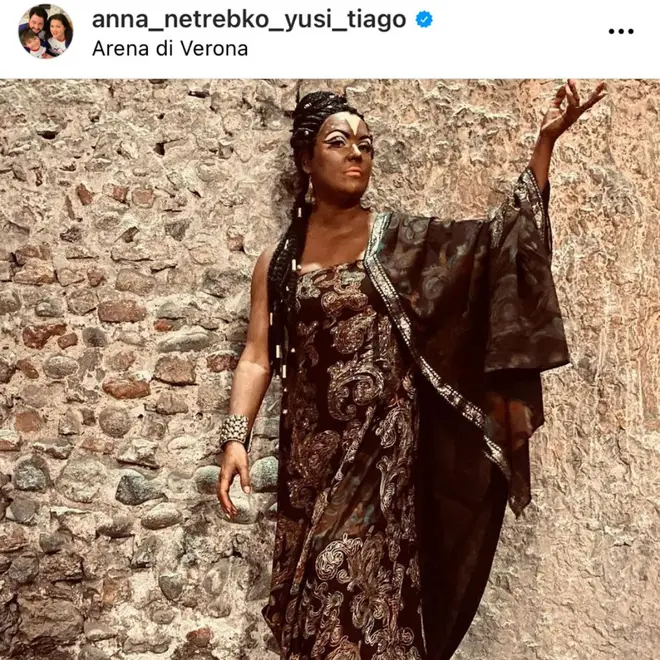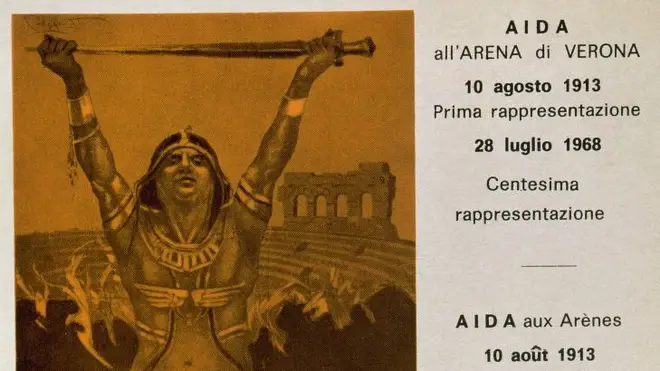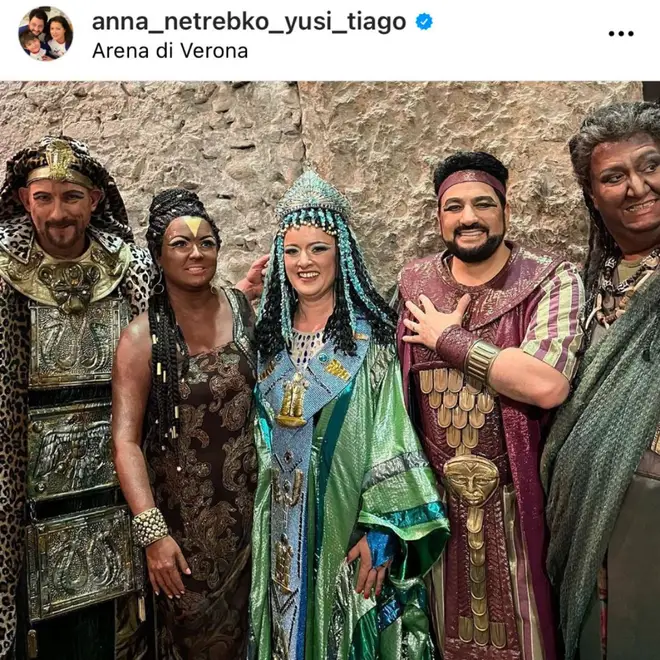On Air Now
Relaxing Evenings with Zeb Soanes 7pm - 10pm
13 July 2022, 10:12 | Updated: 13 July 2022, 15:07

“Aida” by Giuseppe Verdi | 99th Arena di Verona Opera Festival 2022 | ENG | 30 seconds
Anna Netrebko is starring as Aida in the Verdi opera of the same name at the Arena di Verona’s summer festival, and the Italian venue has defended its decision to darken the soprano’s skin for the role.
Anna Netrebko has been cast in the titular role of Aida in Verdi’s opera of the same name multiple times, despite the character being an Ethiopian princess.
This summer the soprano is appearing at the Arena di Verona Opera Festival in the role, and earlier this week, took to Instagram to share photos of herself and the cast. In the photos she appears to be wearing makeup which makes her skin darker; other white presenting members of the cast are seen to be doing the same, including baritone Ambrogio Maestri.
Netrebko, a white Russian soprano, has previously defended her casting in the role. In 2019 when she posted a picture of herself as Aida on Instagram, a fan asked whether the Blackface was necessary, to which Netrebko replied, “I am NOT gonna be white AIDA”, and “Black Face and Black Body for Ethiopian princes, for Verdi greatest opera! YES!”
Blackface is surprisingly still common in the world of opera, and companies are being called out for asking performers to change the colour of their skin in order to perform a role.
In 2019, soprano Tamara Wilson became the first soprano in 106 years to openly criticise the Blackface worn by Aida in the Arena di Verona, whilst playing the role herself. On the second night of the show, the soprano still wore skin darkening makeup, though lighter than originally intended by the production. Wilson did not perform in the third performance and was instead replaced by soprano, María José Siri, who did wear Blackface.
In response to criticism over the 2022 production, Arena di Verona Opera Festival told Opera Wire: “The point is that as long as we do a historical Aida in the Arena, it is very difficult for us to change something.”
Read more: La Scala brings back soprano Anna Netrebko and plans to open new season with Russian opera

Verona continued: “We have two ‘Aidas.’ One is a copy of the one that opened the Arena di Verona in 1913 and this is a replica. The second one is the Zeffirelli ‘Aida’ which was made when these sensitive topics were not such an issue. Everywhere in the world used to have what you call Blackface.
“So as long as we have a historical production, it is very hard to change them because it means changing something that was designed that way. Somehow, the Arena di Verona is a theatrical museum. We don’t have New Productions every year. We want our history to feel like it is living.”
The company added: “We decided to have a philological approach and as long as we don’t have a new production, we follow that philological approach. We must respect the historical truth.”
The company also noted, “we follow what was made in 1913 and many decades ago when Zeffirelli staged his first ‘Aida.’ We are following what they decided to do in that era. Our season is like a historical museum of the theatrical taste during the last century.”

Opera performers across the world were quick to comment on their disappointment with the decision from the Italian venue.
Michael Sumuel, an operatic bass-baritone from Texas commented on Twitter, “It’s very simple: Blackface is disgusting. I don’t care how famous you are or if you’re the opera company. You can get out of here with your “artistic expression.”
Mezzo-soprano, Jamie Barton, also shared her views on the social media platform and said, “It's been a long day and I'm hella tired, but I’m not too tired to say that BLACKFACE IS, AND ALWAYS WAS DISGUSTINGLY WRONG. (Whyyy is this even a question?? How is this not obvious?!)”. The singer then tagged both Netrebko and Verona asking them to “do better. It’s seriously not that hard.”
It’s very simple: Blackface is disgusting. I don’t care how famous you are or if you’re the opera company. You can get out of here with your “artistic expression.”
— Michael Sumuel (@MichaelSumuel) July 12, 2022
In 2020 when the Metropolitan Opera published its statement in support of Black Lives Matter, social media was quick to ask whether the opera company would be removing its production of Aida from the Met website, which starred Netrebko in blackface.
The production from 2018 had Netrebko in dark makeup, despite the opera company announcing in 2015 that it would eliminate the use of “ethnic makeup” in all of its productions. The broadcast of the production has not been removed from the on demand section of the Met’s website.
Productions such as Verdi’s Otello have historically included performers changing their skin tone in order to play Black roles. Puccini’s Madam Butterfly has also had performers in Yellowface portraying Asian characters.
Various musicians have raised awareness of why Blackface and Yellowface is outdated and offensive, and some opera companies have moved to banning the practice.
Read more: Paris Opera considering Blackface ban after staff pressure to end racism

For some opera houses, this means casting performers from any ethnicity in roles, but without changing their skin tone. In others, this means casting ethnically appropriate singers in the roles.
In the face of Netrebko’s casting, and the surfacing of her photos earlier this week, many musicians shared their disappointment that the practice of Blackface is still occurring in 2022.
One soprano shared Netrebko’s Instagram post on Twitter and said: “In case you thought the opera world has made any sort of tangible progress re: blackface, the industry’s most famous soprano posted this 9 hours ago from her recent Aida.”
Another soprano also posted: “I’ve never seen opera companies obsess about “ethnic and historical accuracy” in any opera except Aida.
“Why is that? What would happen to the opera if you didn’t blackface? What would happen is - nothing. No impact on the production. No impact on the storytelling. None. Zero.”
The Twitter user added, just “book more Black singers, you dinosaurs!”
The Arena di Verona added in their response that, “When we discuss modern things, we have to remember that we are using an old historical production. Next year we will have a new production of ‘Aida.’
“We should be judged on next year’s new production. We understand this is a very important topic around the world and we will change accordingly.”